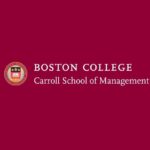I was lucky enough to receive a fresh review of the Boston College Masters in Finance program from a very helpful alumni. The program has been growing and just recently adding a new quantitative track master in finance option. Enjoy the review!
1) What made you want to get an MSF in general? What made you choose Boston College in particular?
I chose to obtain a master in finance degree mainly to differentiate myself from other candidates pursuing finance positions and to advance my career in the future. Given the current economic environment of the past few years, obtaining the MSF would further develop my finance knowledge, strengthen my resume, and build-out my professional network necessary to compete in the marketplace. Additionally, a Masters or MBA is often required to move beyond certain levels within a business. I’ve known since entering undergraduate studies that I would return to business school at some point, and the ability to obtain the MSF in one-year was appealing having already known that I wanted a career in finance as opposed to another business field with an MBA.
After researching various programs, I applied to two programs, both of which I was accepted. I ultimately chose the Boston College MSF because of the well-rounded curriculum and its location in the Boston market. I wanted to stay in the Northeast, and decided BC’s strong brand and reputation would allow me to pursue job opportunities in Boston as well as other North East regions including New York, Philadelphia, and Washington DC.
2) Who would you recommend the Boston College Master in Finance to?
As stated above, the Boston College MSF program has a well-rounded curriculum that is applicable to all finance positions, be it in corporate finance or wealth management. Although I obtained a corporate finance advisory position upon graduation, I believe that the BC MSF is geared a bit more towards wealth management, probably in part due to strong wealth management employer relationships and famous alumnus Peter Lynch.
Additionally, BC will begin offering a quantitative master in finance program beginning in 2012 that should appeal to those prospective students who wish for a career in a more heavily math-intensive field. Although the program was not available while I was at BC, I understand the program incorporates MSF, PhD Economics, and PhD Finance courses.
3) Pros and Cons (if any) of the program?
One pro of the program is the strength and diversity of the Boston College MSF faculty and student body. The professors come from a variety of backgrounds including academic, professional, and adjunct professors who are currently still practicing their field of finance. The student body is made up of a wide range of backgrounds, both culturally and professionally. The program is largely focused on project deliverables in small groups, and I can honestly say that I learned as much from working with my peers as I did the professors, which is a testament to the students and the program structure. I understand some programs have a more “high-level” classroom discussion approach to reviewing cases, but by completing narratives and models in addition to the classroom dialogue, students are able to learn more detail about the subject matter while developing project deliverables that you will encounter in the work environment.
One con of the program is a result of having such a diverse student body. Each master in finance course you take will include some part-time students. While it is a positive of having these students in the classroom for their expertise and network, logistically it requires the classes to be held at night. This can be a bit difficult for some students to get used to, however, it does free up the majority of the daytime to complete the group projects.
4) Anything else you want to add. Feel free to talk about whatever.
The well-rounded curriculum cannot be stressed enough. Any prospective MSF student should research as many programs as possible because I personally found that each MSF program can differ significantly from school to school based on core courses, electives, professors, and employer relationships. Finally, obtaining a master in finance degree from any institution is sure to open doors in many locations, but prospective students should be keen to the fact that they majority of employers will be looking at schools in their direct market. This by no means should limit a prospective student to only look at schools in the area they wish to work afterwards as I can attest to interviewing for positions in several different cities coast-to-coast, but it is worth being aware of during the research process.
Here is a link to the Boston College Masters in Finance Program



